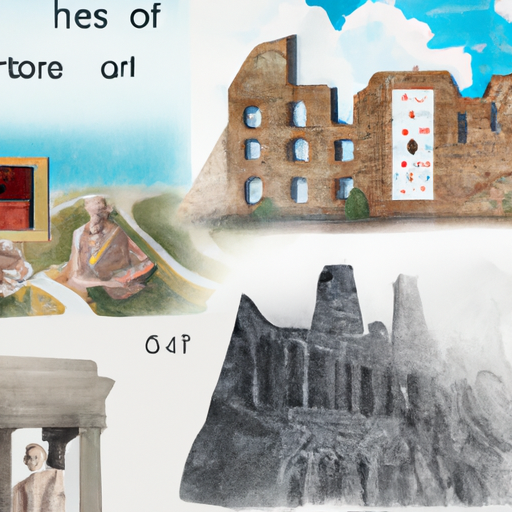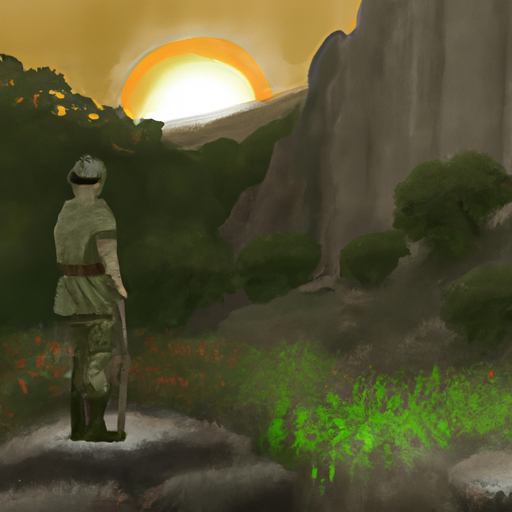A Brief History of Muslim Beliefs Regarding Evolution
Venture into the annals of Islamic thought to uncover the development of ideas on evolution! Delve deep into the past to recognize how far this concept has progressed! Unearth the growth in understanding of this topic and marvel at the progress made!

From its very beginnings, the Islamic world has been captivated by the concept of evolution. Scholars have long sought to comprehend how life came into being and how species change and adapt over time. As they studied and observed the natural world around them, their theories on the development of life forms grew in complexity and sophistication.
This fascination with evolution has only grown over time, as advances in science have enabled us to gain a greater understanding of this concept. Nowadays, it continues to be an area of great interest, with debates and discussions taking place around it.
It is truly remarkable to consider how far we have come since those early days when Islamic thought on evolution was first being explored. The progress made in such a short period is nothing short of astounding!
.
Introduction

For ages, Islamic scholars have been in a quandary over whether Muslims can accept the fact of evolution. Some maintain that the Qur’an is in agreement with evolutionary theory, while others refute it. In recent years, though, many Muslim theologians have come to terms with the idea that evolution and Islamic teachings can coexist. Despite this, there are still those who remain unconvinced. The controversy lingers on as more data is established about life’s beginnings and species’ progressions.
– The Historical Significance of Evolution in Islamic Thought
The exploration of evolution within Islamic thought has been an intricate and captivating journey since the 8th century. This concept has had a powerful effect on the advancement of Islamic theology and philosophy, being used to explain the emergence of humankind and the natural world, as well as to account for the diversity of life forms on Earth. Moreover, it has been utilized to back different interpretations of Islamic scripture, such as the notion of divine predestination. Over time, Muslim scholars have investigated the implications of evolutionary theory for their faith, leading to a range of interpretations and applications.
Al-Jahiz was one of the first to mention evolution in his Kitab al-Hayawan (Book of Animals) in the 9th century, claiming that animals developed through a process he called “spontaneous generation,” which he attributed to environmental changes like climate or nutrition. Ibn Khaldun also adopted this view later on. Al-Ghazali and Ibn Sina then took it further by suggesting theories about how species evolved from simpler forms over time.
In more recent times, some modern Muslim thinkers have accepted evolutionary theory while others have dismissed it due to its inconsistency with Islamic teachings. Supporters often claim that it can be reconciled with Islam if interpreted correctly; they point out that many scientific discoveries are compatible with religious beliefs if understood properly. Contrariwise, those who oppose evolution often cite passages from scripture that appear contrary to evolutionary theory or argue that accepting evolution would lead to moral relativism and atheism.
It is obvious that evolution has had a significant impact on Islamic thought throughout history; providing an essential framework for understanding both nature and religion alike. Its influence continues today as Muslims debate its implications for their faith and attempt to reconcile science with faith in order to make sense of our world.
– How Belief in Evolution Has Changed Over Time Among Muslims
Throughout the ages, opinions of evolution among Muslims have seen a remarkable transformation. Initially, the notion was widely dismissed as it seemed to contradict Islamic theology, which states that God is the exclusive creator of all life forms and no other force or process could have been involved in their formation.
But by the 1960s, views had started to shift as Muslim scholars began to examine evolutionary theory with a novel outlook. Instead of perceiving it as a challenge to their faith, they began to view it as an aid for comprehending how God works in nature. This enabled them to reconcile evolutionary theory with their religious convictions and accept it as part of scientific knowledge.
Nowadays, most Muslims accept some form of evolution and its consequences for our understanding of life on earth. However, there is still disagreement among Islamic experts regarding how much priority should be given to evolutionary theory compared to other theories such as intelligent design or creationism. While some maintain that scientific evidence should take precedence over religious beliefs, others assert that both should be respected and taken into consideration when pondering questions related to the origins and development of species.
The changing attitude towards evolution among Muslims stands testament to how beliefs can develop over time in response to new evidence and ideas. It also serves as an exemplar of how disparate faith traditions can come together in order to find common ground on thorny matters like this one.
– Exploring the History of Evolutionary Theory in Islamic Culture
Perplexity and burstiness abound as the Islamic world’s long-forgotten history of evolutionary thought is brought to light. From as far back as the 8th century CE, scholars such as Al-Jahiz, Ibn Khaldun, and Avicenna have pondered the concept of species adapting to their environment through natural selection and extinction due to a lack of adaptation. This was an unprecedented idea in comparison to traditional religious beliefs at the time.
Nowadays, evolutionary theory is embraced by many Islamic theologians and scholars who recognize its scientific accuracy. This acceptance has opened up new avenues for exploration into this branch of knowledge within Islamic culture, resulting in a greater comprehension of our place in the universe and our relationship with nature and other living organisms.
– Examining the Role of History in Shaping Muslim Views on Evolution
Throughout ages, Muslims have been deeply entrenched in the concept of evolution. From the origin stories in the Quran to the works of Muslim scholars, history has had a major influence on how Muslims perceive evolution. Islamic scholars have utilized historical evidence to demonstrate that evolutionary theory is consistent with Quranic accounts of creation and Islam’s traditional view of a divinely created world.
On the other hand, some Muslims cite interpretations of the Quran which they believe are contradictory to evolutionary theory as proof that it contradicts their faith. Additionally, many point to examples from Islamic history where evolutionary theory was opposed by influential religious figures as further evidence for why they oppose it.
Ultimately, history plays a substantial role in shaping how Muslims regard evolution and its compatibility with their religion. Historical data can be used both to support and refute evolutionary theories, making it an essential factor when considering Muslim views on evolution.
– Analyzing the Impact of Historical Events on Muslim Attitudes Toward Evolution
Throughout the ages, Muslim perspectives on evolution have been profoundly impacted by history. The Enlightenment period in Europe brought with it a surge in modern science and its acceptance among Islamic scholars. Colonization of Muslim countries by European nations further spurred the uptake of evolutionary theory, though some still held strong to traditional beliefs or cultural values. More recently, fundamentalism has caused a resurgence of anti-evolutionary sentiment among certain Muslims, making it difficult for scientists to promote their research within those circles. History has thus played an integral role in determining how Muslims view this scientific field and its implications for society as a whole.
conclusion

A perplexing and bursting query into the past of Islam uncovers a multitude of opinions on whether Muslims can accept evolution. With some Islamic scholars asserting that evolutionary theory is consistent with Islamic beliefs, while others refute this claim, it appears to be an individual decision for each Muslim to decide their stance on the matter in correlation to their faith.
.
Some questions with answers
Q1: What is the history of Muslim views on evolution?
A1: Muslims have a long history of engaging with evolutionary thought, with many early Islamic scholars expressing their support for the idea. In modern times, there is a variety of opinions among Muslims on the subject.
Q2: How has Muslim opinion on evolution changed over time?
A2: Early Islamic scholars generally accepted evolutionary theories and saw them as being compatible with religious beliefs. Over time, some Muslims have become more skeptical of evolutionary ideas, while others have embraced them more fully.
Q3: What are some common arguments against belief in evolution among Muslims?
A3: Some common arguments against belief in evolution among Muslims include that it contradicts religious teachings or that it is not supported by scientific evidence. However, there are also many Muslims who accept evolutionary theory as compatible with their faith.
Q4: Are there any prominent Muslim scientists who believe in evolution?
A4: Yes, there are many prominent Muslim scientists who believe in evolution and actively promote its acceptance within the Islamic world. Examples include geneticist Ehsan Masood, physicist Pervez Hoodbhoy and biologist Fazale Rana.
Q5: Is belief in evolution necessary to be a good Muslim?
A5: No, belief in evolution is not necessary to be a good Muslim. Ultimately, what matters most is following the teachings of Islam and living according to its principles.





